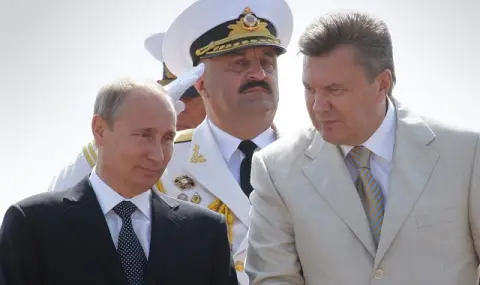What is happening in Georgia is very reminiscent of the path of Ukraine . Will Tbilisi survive a second pro-Western revolution? One thing is clear: this will greatly depend on the course of the war in Ukraine.
Viktor Yanukovych's name has not been mentioned in the news for a long time, but the former Ukrainian president, who fled to Russia 10 years ago, was mentioned in Georgia. Bidzina Ivanishvili, a billionaire who made his fortune in Russia, former prime minister and honorary chairman of the ruling Georgian Dream party, did just that. Speaking at a rally in Tbilisi in late April, Ivanishvili said his country was "not Shevarnadze-era Georgia or Yanukovych-era Ukraine." Both politicians lost power as a result of protests. Ivanishvili thus made it clear that his party has no intention of relinquishing power.
The law on "foreign agents" and Yanukovych
In Georgia, protests broke out because of the draft law "on transparency of foreign influence", which is essentially an analogue of the Russian law on "foreign agents". The first attempt by the Georgian authorities to accept it failed a year ago due to protests. This time the ruling party is not backing down. The Georgian parliament voted in favor of the bill on second reading, with final approval scheduled for mid-May. A similar law has long been in place in Russia, where it has been used to discredit all critics of the government, from non-profit organizations to politicians, media and bloggers. The Georgian opposition believes that the country is following the path of Russia and turning its back on the West.
During Yanukovych's time, Ukraine also had a law on "foreign agents". It was part of a package of laws passed amid opposition protests in January 2014. It fueled the confrontation in Kyiv. Within a month, at the end of February 2014, Yanukovych and members of his government lost power, and many of them fled to Russia. It was the second pro-Western revolution in Ukraine. The first, the Orange Revolution, took place in 2004 and ended in a peaceful change of power, just like the Rose Revolution in Georgia a year earlier. And now?
The European rhetoric against the background of rapprochement with Russia
There are similarities between Ukraine and Georgia. Yanukovych was a pro-Russian president, but he came to power under the slogan of European integration of Ukraine. Many believed that he would bring the country into the EU. But his pro-European rhetoric was at odds with his government's pro-Russian policy, until a complete reversal followed in autumn 2013, when the signing of the agreement with the EU was suspended.
In Tbilisi "Georgian Dream" formally maintains a pro-European course, but in fact is increasingly moving away from Europe and closer to Moscow. Georgia does not support Ukraine in the war and develops business ties with Russia. Tbilisi is also refusing to impose sanctions over Russia's war on Ukraine, and trade with Russia is increasing. And this despite the fact that Georgian volunteers are fighting on the side of Ukraine, and about a third of the Georgian population believes that the authorities do not support Kiev enough.
The West observes what is happening with bewilderment, but with the hope that it will not lead to a new political crisis. US presidential elections are coming soon, relations between Tbilisi and Washington have cooled, and Brussels has already granted Georgia the status of a candidate country for EU membership in December 2023. With the adoption of the law on "foreign agents" rapprochement with Europe can effectively be stopped. We can assume that the real purpose of the "foreign agents" is to stop rapprochement with Europe, but not to announce it officially, as Yanukovych did.
Georgia's European exchange rate is weaker than the Ukrainian one
More than 20 years ago, Georgia became the first post-Soviet state to undergo a peaceful revolution and change of power, Ukraine the second. The two countries were considered not only the most pro-Western countries in the Commonwealth of Independent States, but also very close.
Since then, attempts have been made in both countries to return to a formally multipolar but essentially pro-Russian course in the economy and foreign policy. Georgia did this despite the de facto Russian occupation of Abkhazia and South Ossetia. In Ukraine, attempts to return to Russia's orbit have failed. Yanukovych did not last even one term in power, while "Georgian Dream" ruled for more than a decade. Obviously, a significant part of the public is satisfied with the party's policies. The Euromaidan in Ukraine was much larger than what is happening in Georgia. Pro-Western President Salome Zurabishvili, who does not support the "foreign agents" law, has limited options.
For now, it is not entirely clear which path Georgia will finally choose. The course of Russia's war against Ukraine will play a big role. If Moscow prevails, it will give it the strength to continue its imperial policy in the post-Soviet space. At the same time, the defeat of Ukraine would weaken both the West itself and the powers in Europe that aspire to become members of the Western club. In such a case, Ivanishvili, who has changed his rhetoric and accuses the West of turning "Georgia and Ukraine into cannon fodder", may retain his influence.
Perhaps the parliamentary and presidential elections in the fall of 2024 will provide clarity. The pro-European course in Georgia has so far been weaker than in Ukraine. And Ivanishvili acts more cautiously than Yanukovych. But he will not be able to stay long in the sword between Russia and the EU. Much will depend on whether the protests remain peaceful, or whether the authorities resort to violence, as Yanukovych did. Then Ivanishvili and "Georgian Dream" may suffer the fate of the Ukrainian president and his "Party of the Regions", and Georgia, like Ukraine, may experience a second pro-Western revolution.
